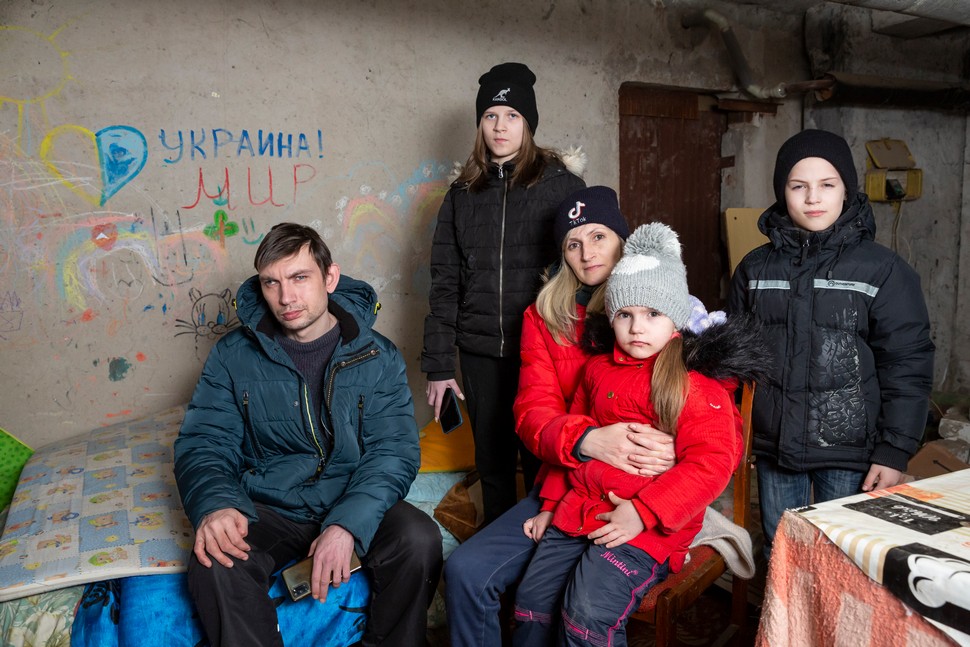People of the dungeon: A family from Kharkiv lived in a basement for 200 days

It is cool and drafty in the basement of this 16-story building on Northern Saltivka. Dusty communication pipes stretch along the walls, wires hang from the ceiling. It is hard to believe that people lived in these conditions for a long time. They didn't just periodically hide from shelling - but really lived for at least 200 days! Here they spent all their time, slept and prepared their food.
But then you see something that brings a smile to your face. These are children's chalk drawings on the walls. And the inscriptions, "I love Ukraine.” These are the youngest inhabitants of the basement, trying to have fun during periods of silence. They left their drawings as evidence of the days spent here.
Viktor's family settled in the basement from the very first days of the large-scale invasion.
"We lived on the 16th floor of the building. On February 24, my wife woke me up at five in the morning," Viktor recalls. “We couldn't even think that it would start in our city. We started to wake up the children - we have three of them. My wife was so confused that she fell into a kind of stupor. We sat on our haunches, all trembling and crying. It's good that mother was nearby. She acted more decisively and coordinated in this situation. She began to collect the children. We went downstairs and ran to the kindergarten, where my wife works as a cook. When we ran, we heard explosions-all this was literally whistling over our heads."
The kindergarten had a basement, where the family spent about a week. A small, two-story building seemed safer in this situation than a huge multi-story building.
Viktor periodically visited his apartment in times of calm to take some things. During one of these visits, he met with neighbors who had already arranged a "dwelling" for themselves in the basement of their house. They were invited to join. At first Viktor hesitated, but then something happened that finally convinced him: Several high-rise buildings were destroyed in Northern Saltivka.
"I can't explain it. But, from a technical point of view, I saw with my own eyes that the 16th floor was destroyed, and the people in the basement survived," he says.
Gradually, several other families joined them. At different times, their number varied from three to 10. Smaller rooms were located on both sides of the central corridor, and each family arranged them at its own discretion.
Later, electricity was brought into the basement in order to cook food and occasionally turn on the heaters. One room was set aside for "water treatments" and a toilet, which was served by an ordinary bucket. Life was getting better little by little. Still, the war made it impossible to relax even for a moment.
Viktor remembers how one sunny morning - closer to spring - he took the children outside to breathe fresh air for about 15 minutes. It was quiet and peaceful when, suddenly, there was an explosion. Completely unexpected. He was reminded that danger awaited at any time.
Viktor describes a constant misunderstanding of the situation and lack of information—and fear—that kept them there. What if the same thing happens wherever we go? At least, in your city, you know everything and feel more confident.
And, it was also here where Viktor and fellow families were taken into the care by the local branch Caritas-Spes, and its leader Father Wojciech, who brought food and supplies and comforted them with prayers and kind words.
Local policemen also helped to bring aid.
"There were a lot of such basements throughout Kharkiv," recalls Andriy, a police officer. "It was important to help everyone. I especially wanted to support the children: with toys, sweets, warm things, so that even in the basement, childhood was childhood. Of course, such a life in conditions of constant danger hurts the children's psyche. It is desirable for these children to receive psychological help in order to overcome the consequences of the traumatic experience."
Victor's family was able to eventually return to their apartment on the 16th floor. But he is in no hurry to dismantle his shelter in the basement. Neighbors are not in a hurry, either. After all, as they say, the war continues and you have to be ready for anything.
"We don't know what will happen tomorrow. Danger is still in the air and we do not rule out that at some point we will have to hide here again from shelling," says Viktor. "Every time we wake up or go to bed, we think that this day or the night passed peacefully. Let there be no more need to go down to the basement again. And we also very much want to invite Father Wojciech to a party: To sit, talk, treat with my wife’s chebureks - she cooks them perfectly– and to say thanks for all the good things that he generously shared with us."






